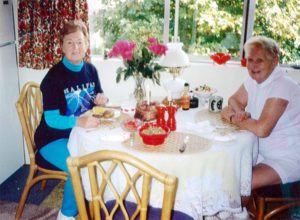Home »

A reason to change
Letter to the Editor
The advice given most often to families of alcoholics is that “you can’t change anyone who does not express a desire to change themselves.”
But my experience is different. For me and my family, the use of an intervention with the guidance of a qualified counsellor gave my mother a reason to stop drinking.
On August 11, 1987, my two sisters and I sat anxiously in the living room of my younger sister’s apartment in North Vancouver. My aunt and the drug and alcohol counsellor sat with us nervously glancing at the front door. We were all waiting for Mom to come through the door – in her mind to join us for tea – in reality, to do an intervention to get her to stop drinking.
Mom had been slurring her words more often lately when we called her and she did that annoying hand gesture that she does when she’s drinking, all the time now. It wasn’t fun to visit Mom anymore as she was usually lying on her bed watching T.V. with a cigarette in one hand and a drink in the other. The dinners she invited us for were burnt and tasteless. Most of Mom’s friends had disappeared over the years to be replaced with drinking buddies. Four years earlier our Dad had passed away from alcoholism after years of living a life of self-destruction with his drinking. We were determined that we were not going to lose Mom to alcoholism as well.
All three of us sisters read an article in the Readers’ Digest magazine at the same time, which caused us to call one another and talk about Mom’s drinking and what we could do about it. The article was titled, “How to Stop the One You Love from Drinking” by Betty Ford.
We went to a drug and alcohol counsellor who educated the family in all of the buzzwords of alcoholism, such as “enablers” and “co-dependents.” We discovered how each one of us allowed Mom to continue to drink. Yes, “allowed” her to drink.
We looked up Mom’s old friends and educated them on Mom’s alcoholism by giving them the book by Betty Ford to read and asking them to write a letter to Mom. You see, the counsellor instructed everyone to write a letter to Mom to be read aloud during the intervention.
The letter detailed how the drinking affected their relationship, their love and concern for Mom’s health and, most importantly, a bottom line stating how each of us felt about her drinking. We had many friends willing to write letters but not attend the intervention, and that was fine. We spoke to Mom’s doctor who reported a few health concerns he had and a note of her hands shaking. We also talked to her employer who reported that her job was on the line because of her shaking hands and the smell of alcohol on her breath.
So, there we were all waiting that summer morning with the letters ready. The counsellor had set up a Detox appointment immediately following the intervention. In detox, Mom would stay two to three days going through withdrawal symptoms under supervised medical care, and then she would begin a six-week rehabilitation program in Victoria. Everything was all arranged. Even her bag was packed.
Mom knocked on the door and then she entered the living room. We could see that she wanted to bolt; she knew something was up. But, she quietly sat down and began listening to our concerns for her.

I can’t ever remember feeling so emotionally drained as I did that day. It was a gut-wrenching, tear-jerking experience for all of us. The letters from our family were read first, with each one of us breaking down in tears as we read them. As instructed by the counsellor, each letter had to have a bottom line outlined in it. For me, I told Mom that I would no longer leave my children with her when she was drinking. Then the letters from her brothers and all of her friends were read. Finally, the letters from her doctor and her employer were read.
In the end, the counsellor asked Mom simply, “Are you ready to go to detox now?” Mom answered yes. But before she left she stood tall and looked everyone in the eye and said, “I’m sorry.”
Mom went to Detox with the counsellor and she stayed there for a week before she began her rehabilitation program in Victoria. My sisters and I visited Mom in Victoria where we were able to go for walks with her along the waterfront. The counsellors spoke with us without Mom to further educate us on alcoholism and to inform us of how she was coping.
On our walks, Mom told us about the people in the program, saying that there were people from all walks of life struggling with alcoholism or drugs, even doctors. She was resentful for being “tricked” into rehab and insisted that she had planned to quit drinking on her own anyway.
I don’t believe that was true, but, to the best of my knowledge, she hadn’t had a drink since that day. Mom passed away 22 years later after living an active, happy and full life with her family and many friends.
If someone you know is alcoholic, don’t wait for them to change. Give them a reason to stop drinking. Come together in a loving and caring intervention.
Not every intervention works, but many do. And what have you got to lose? Alcoholism wounds, and alcoholism kills.
Sandy McArthur,
Cranbrook







